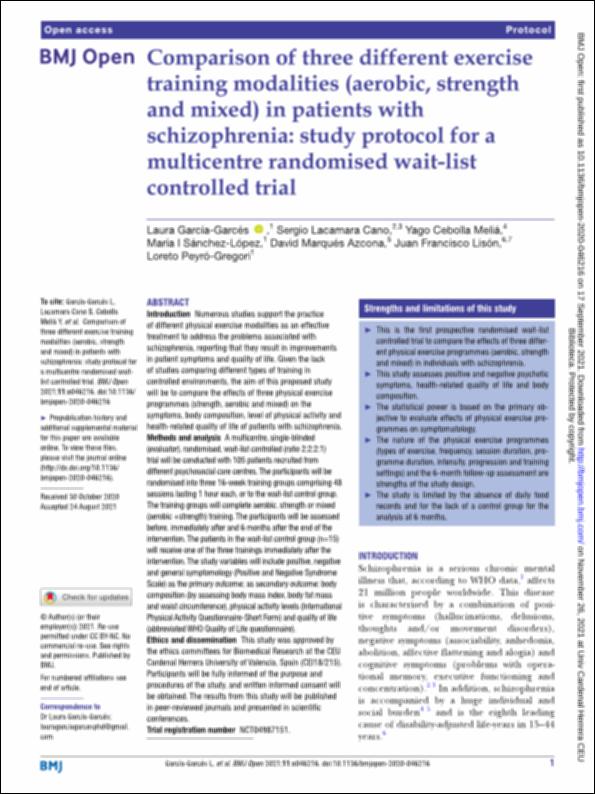Please use this identifier to cite or link to this item:
http://hdl.handle.net/10637/13239Comparison of three different exercise training modalities (aerobic, strength and mixed) in patients with schizophrenia : study protocol for a multicentre randomised wait-list controlled trial
| Title: | Comparison of three different exercise training modalities (aerobic, strength and mixed) in patients with schizophrenia : study protocol for a multicentre randomised wait-list controlled trial |
| Authors : | García Garcés, Laura Lacamara Cano, Sergio Cebolla Meliá, Yago Sánchez López, María Inmaculada Márques Azcona, David Lisón Párraga, Juan Francisco Peyró Gregori, María Loreto |
| Keywords: | Ejercicio físico - Uso terapéutico.; Esquizofrenia - Tratamiento.; Exercise - Therapeutic use.; Schizophrenia - Treatment. |
| Publisher: | BMJ |
| Citation: | García-Garcés, L., Lacamara Cano, S., Cebolla Meliá, Y., Sánchez-López, M.I., Marqués Azcona, D., Lisón, J.F. & Peyró-Gregori, L. (2021). Comparison of three different exercise training modalities (aerobic, strength and mixed) in patients with schizophrenia: study protocol for a multicentre randomised wait-list controlled trial. BMJ Open, vol. 11, i. 9 (17 sep.), art. e046216. DOI: http://dx.doi.org/10.1136/bmjopen-2020-046216 |
| Abstract: | Introduction Numerous studies support the practice of different physical exercise modalities as an effective treatment to address the problems associated with schizophrenia, reporting that they result in improvements in patient symptoms and quality of life. Given the lack of studies comparing different types of training in controlled environments, the aim of this proposed study will be to compare the effects of three physical exercise programmes (strength, aerobic and mixed) on the symptoms, body composition, level of physical activity and health-related quality of life of patients with schizophrenia. Methods and analysis A multicentre, single-blinded (evaluator), randomised, wait-list controlled (ratio 2:2:2:1) trial will be conducted with 105 patients recruited from different psychosocial care centres. The participants will be randomised into three 16-week training groups comprising 48 sessions lasting 1 hour each, or to the wait-list control group. The training groups will complete aerobic, strength or mixed (aerobic +strength) training. The participants will be assessed before, immediately after and 6 months after the end of the intervention. The patients in the wait-list control group (n=15) will receive one of the three trainings immediately after the intervention. The study variables will include positive, negative and general symptomology (Positive and Negative Syndrome Scale) as the primary outcome; as secondary outcome: body composition (by assessing body mass index, body fat mass and waist circumference), physical activity levels (International Physical Activity Questionnaire-Short Form) and quality of life (abbreviated WHO Quality of Life questionnaire). |
| Description: | Este artículo se encuentra disponible en la siguiente URL: https://bmjopen.bmj.com/content/bmjopen/11/9/e046216.full.pdf |
| URI: | http://hdl.handle.net/10637/13239 |
| Rights : | http://creativecommons.org/licenses/by-nc/4.0/deed.es |
| ISSN: | 2044-6055 (Electrónico). |
| Issue Date: | 17-Sep-2021 |
| Center : | Universidad Cardenal Herrera-CEU |
| Appears in Collections: | Dpto. Enfermería y Fisioterapia |
Items in DSpace are protected by copyright, with all rights reserved, unless otherwise indicated.


